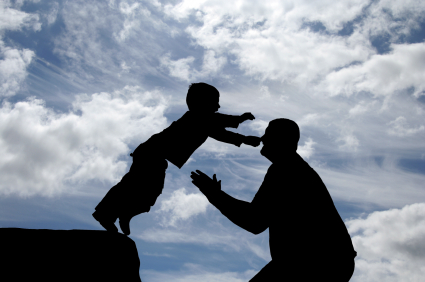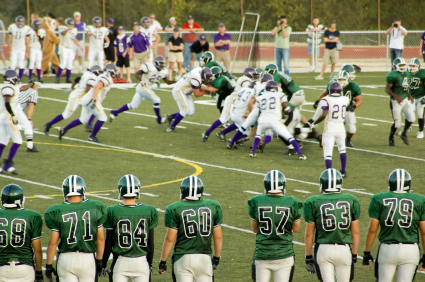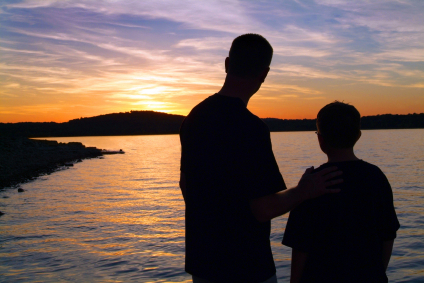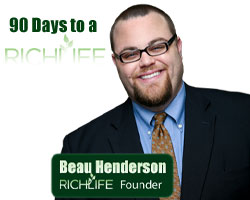
A Father's Legacy: Investing in Relationships
By: Beau Henderson
None of us know how much time we have left on earth. I saw this first-hand at the age of 23 when my father passed away unexpectedly. I am now a financial planner in the business of helping people plan for their future, and most clients come to me with their concerns for money. I try to help them see the bigger picture. My dad didn’t have enough time to amass a vast fortune, but he did leave behind a legacy. He left me the foundation for my RichLife.
I first learned how to make wise investments from my dad, but not in the way you might think.
As defined, stewardship is the behavior of an accountable person. I admit the word sounds a little outdated, but the concept is both timeless and wise. As a financial advisor, it forms the foundation for what I pass on to my financial planning clients, my coaching clients, and my family. Its root word is keeper, meaning one who cares for and manages people and things.
I first learned the application of this word by watching the way my dad went about his everyday life. As a kid, I would notice how he budgeted his time, energy, and money to invest in the most important asset of all: PEOPLE.
I can't tell you the number of times someone I hardly even knew would give me a hand up just because they knew my father. “You're Jimmy's son,” they would say, “Let me give you some help with that!”
When he died unexpectedly at the age of 49, I couldn’t believe all the people that showed up for his funeral. It seemed to me like the entire town was there. And the funny thing was, I heard all of these stories from my peers, from kids my own age whom I hardly even knew, about how my dad had helped them. It turned out that he was a kind of role model for a lot of people.
The careful management of that which has been given to us pertains to many facets of life. Our assets include financial and physical treasures as well as those that are human.
My dad used to tell me, “Just because you're here and breathing doesn’t mean the world owes you anything! You've got to earn it!”
It comes down to one important distinction:
Do we view our talents and physical possessions as something we own and are entitled to? Or as special gifts that have been entrusted to us?
My gifts and talents would turn out to be in the field of finance, but my dad, Jimmy Henderson, was interested in horticulture. He owned a retail plant nursery in the small town of Cumming, Georgia, where I grew up. Some of my best memories come from the days I spent playing at the nursery, running through the pine scented mazes at Christmastime. Some of my most miserable memories come from there also, like the day I got in trouble for building a fort out of his hay supply, or the long hours I spent helping to move rocks. All the same, I was learning lessons.
As a kid growing up, we didn’t have a lot of money. My dad managed what he had diligently, investing money back into the nursery and growing a very successful business. But after his passing, life became much more difficult for my mother.
I was 23 at the time, and working in a hospital doing intake for mental health patients. I’ve always had an interest in people and a desire to help them, so I was studying psychology. But none of us were prepared for my father’s death, least of all my mom. I undertook the task of helping her sort through the finances, and found myself doing hours of self-study and research, reading articles and books about financial planning. I transitioned into a management program at a bank and went back to school. By the end of the following year, I had changed course completely and was on my way to my new career in finance.
I absolutely enjoyed it. Because of my own personal experience, I realized this was a role where people needed help. During times of transition such as divorce or death, people are at their most vulnerable, both emotionally and financially. These times are when Money is in Motion, and critical decisions often have to be made. If there is not a person able to help them who has their best interests in mind, there’s a good chance there are at least ten people waiting on the sidelines, ready to take advantage of the situation.

Being a financial advisor has always been and always will be
more than just an income for me.
The practice of wise stewardship taught me to treat my clients as relationships, not transactions. When we come from a place of entitlement, we have a sense of being better or separate from that which we own or serve. Instead of attracting more of the things we want into our life, we end up pushing them away.
Changing the way we treat our assets can result in a drastic and life altering shift.
Once you become aware of this, you can begin to make the shift to another way of looking at your assets, physical, financial, and human. You can become their keeper. Adopt a grateful attitude toward who or what they are, and what they are able to provide, and in so doing you will increase their productivity and your wealth.
When we seek not to turn a profit, but to add value to the lives of those we serve, true wealth building can begin.
Early on in my career as a financial planner, I became aware that merely crunching through the numbers and running countless appointments was not fulfilling. I wanted to help my clients not just achieve their financial goals, but their life goals as well. My definitions of wealth and rich also takes this into account. When I began to take a more holistic approach to my work, things fell into place and RichLife Advisors was born.
When people think about their legacy and what they want to leave behind for their family, often times the first thing that comes to mind is money. But when I advise my clients about Legacy, I ask them to think about these three areas:
- Heritage
- Education
- Money
Heritage: When my father died, I was struck most by how much he had impacted the lives of others. The way he invested in creating unique experiences with not just his family but with all those who knew him, and the way he invested in those relationships, didn’t fully reveal itself to me until I was old enough to understand.
Your unique experiences become the stories you share with others. When you invest in creating these experiences with the people you care about, they also become blessed with wonderful memories. The one thing my clients always tell me is that they wouldn’t trade their memories and experiences for all their net worth. These assets are priceless to them, and worth every penny and hour invested.
Wise stewardship of our memories encourages these stories to be shared.
They can be passed on either by word of mouth, through photographs, written documents or books, and video recordings. I’ve seen amazing legacies preserved on DVD’s, lovingly recorded and edited by a family member and chronicling a life story as told by an elder grandparent or relative.
My own dad came from a large family of 4 brothers and 5 sisters, and when I was a kid, his mother lived on the property that adjoined ours. Holidays and family gatherings happened at Granny’s house and I was surrounded by cousins and grandkids numbering 40 or more. These were fun times. My mom and I often go through old photographs and see that my dad was always there among us. Although he worked long hours at the nursery, he made time to experience these get-togethers. As a man who loved to tease and laugh, he enjoyed every minute he was able to be a part of them.
He would later go on to become involved in local politics, not for his own personal gain, but out of a sense of stewardship to his hometown. He was known as someone who looked out for others in the community. I even heard stories from my friends of how he pulled them over for speeding to give them some “friendly” advice!

But my dad’s greatest legacy to me
was the time he spent investing in our relationship.
From the time I was 5 until the time I was twelve, my dad coached my football team. This is how I remember him best: wearing his coaching shorts and the extra-tall baseball cap. He taught me about earned respect, both as a team member and as a member of society.
I came to understand early on that you have to invest in relationships in order to gain trust, and that this is achieved not all at once, but by a series of small deposits made over time, the way you build anything of real value.
I see a lot of people who make the mistake of thinking, “If I’m out there working hard, earning money, then I am taking care of my family.”
But making money never equals taking care of your family
if there are casualties along the way.
Children can grow up in a wealthy home with all the stuff money can buy, but what they long for is a close relationship. No amount of money can create or replace the human connection.
My father died at an early age, but he left me with many wonderful memories. This is a man who was running a business almost seven days a week and yet somehow, he made time for me. Because he thought I was worth his time, I grew up knowing that I was important to him.
I would rather have that knowledge and the memories of our experiences together, than all the money in the world.
Education: My dad never completed college. I always thought he was hard on me, but I understand now it was because he wanted to make sure I had the opportunities that he didn’t. Being from such a large family, his parents weren’t always able to spend a lot of one-on-one time with him. I grew up as an only child for the first 13 years of my life, and benefited greatly from the time my dad invested in me.
When I would ask him how do something, he wouldn’t just do it for me. He would take the time to show me how.
I would gain knowledge and eventually acquire the ability to do that task again and again for myself. Now as a parent or in any area of your life, operating this way requires time. We are all given the same numbers of hours in the day.

Being a good steward of your time means investing it wisely in things that are of value.
One thing I talk to my clients a lot about is raising their Financial IQ. When I spend time with them, I want them to come away knowing more than they did when they came in. While I appreciate that my clients trust me, I want them to understand what they’re doing and why they’re doing it. If you understand something, you’re actually gaining wisdom and you can build on that for the rest of your life. But if you’re just doing what I tell you to do for 20 years and then I go away, you won’t have grown at all. It is my goal that after working with me, you become a better investor. Things that were risky before are now wise decisions because your financial IQ has been raised.
That being said, we all make mistakes. It was my dad who first taught me how to handle the “bad” things that had happened by looking for the valuable lesson being taught. It was my dad who first taught me how to say, “Okay, I messed up here. What can be learned?”
When my friend and mentor, Steve D’Annunzio, shared his view of Life as a School with me, it made a lot of sense and everything clicked into place. We learn from mistakes, both our own and those of others. When you view Life as a School, the difficult times become opportunities for growth. I keep this reminder posted on my office wall:
- We live in a school called Life
- There are no mistakes, only valuable lessons
- A lesson will be repeated until it is learned
- Each time a lesson is repeated it becomes more painful
- The greatest lesson we can learn is choose Love over Fear
Money: The asset that most people think of first actually comes last. When clients come to me for help, those who have invested in their relationships and education end up doing far better in the end than those who don’t, even if at first their finances are in shambles.
This is because money is a tool designed to serve us, not the other way around.
A lot of people have a lot of funny ideas about money. It is either the key to their happiness or the root of all evil, or somewhere in between. The truth is, money is neither good nor bad.
Money by itself is neutral.
It’s what you do with money that dictates its value. As a financial planner, I want to see my clients financially secure, yes, but more than that, I want them to be fulfilled. This realization has led me to create the RichLife mission: “To help others achieve the healthiest, wealthiest, most fulfilled life possible.”
A lot of people focus on the accumulation of money instead of its proper utilization. The funny thing about accumulating money is that the more of it you have, the more you feel yourself to be at risk. This is true of all our financial assets and most of the physical ones as well, including our homes, our cars, and our lifestyle. This is where the practice of wise stewardship plays a very important role.
No one likes to think about dying. Because of this, many families are caught short when premature death does occur. This subject takes on a very personal note with me because my dad worked very hard and had every intention of taking care of his family. None of us ever imagined he would die at such an early age, including him. We simply weren’t prepared.
When decisions about money are made with the idea of wise stewardship in mind, they are no longer done out of fear, but with the intention of doing good. Insurance is one of those products that are sold to us out of fear. We don’t have to buy it for that reason.
I think of death, disability, lawsuits, and erosion factors as The Four Thieves who can steal your RichLife. When you think of it this way, it only makes sense to put a security system in place. Few things are as valuable as peace of mind.
Most of us want to leave something of value behind for our loved ones, to leave the world a better place than when we found it. What you leave behind as your legacy can be defined by three categories: Heritage, Education, and Money. When I give my clients the ultimatum of having to choose only two out of three, most people realize what their priorities are.
Most people would rather pass on the value of their heritage and education rather than a lump sum of money.
With the first two, you give the gift that keep on giving, the skills and knowledge to earn money. As a financial advisor, my priority is for you to live your life, create unique experiences, and invest in your relationships. If there is money left for your family, that’s a bonus! This points to the larger truth that of the three asset classes, human, physical, and financial, only humans have the ability to create the other two.
It is people who are the real asset, not the money they make.
A lot of people worry about what they will leave behind for their family and children. So many of the things we work on are temporary – the homes we own, the fortunes we build, and the documents we type. Things are deleted, lost, or destroyed, but things of real value are not forgotten.
I am grateful for the 23 years I had with my dad, and for the legacy he left behind for me. The investments he made in time, experiences, relationships and money, formed the foundation that allowed me to build a RichLife for myself. I would love to hear one day that you have achieved yours.
The most valuable legacy you can leave behind for your children, your family, and the world at large is a life well lived.
Beau Henderson is a financial advisor, author, coach, radio personality, and CEO of RichLife Advisors. He has helped over 3,000 clients to not just improve their relationship with money, but to live the life of their dreams. His most recent book, The RichLife, 10 Investments for True Wealth, will be available June 1st,2011. To learn more about how you can achieve your RichLife now, grab a free copy of Beau's best-selling e-book "7 1/2 Lies That Keep You from Being Rich" available today at: www.richlifeadvisors.com/

{ 9 comments… read them below or add one }
What a wonderful story! Thanks so much for sharing it with us.
Lily
“Stewardship is the behavior of an accountable person. Just because you’re here and breathing doesn’t mean the world owes you anything! You’ve got to earn it!” Sometimes we learn these lessons the hard way, but our lives become so much richer once learned. Thanks for sharing your story Beau!
Lol, Carol! That is a powerful message, isn’t it? And not a popular one, but like you said, one we will all have to learn sooner or later… sooner sounds good to me, thanks to people like Beau!!! Thanks so much for sharing 🙂
Such a great story…absolutely loved reading it…so inspiring; we only prosper when our soul prospers and what does our soul needs? relationships! The most important relationship is with our Heavenly Father and then our own family. Helping people is such a great purpose in life. Beau helps people in their financial issues when needs arise in people’s lives; wonderful. I am so inspired by this story…my father died when I was 18; he left a heritage to his children, but we never knew him.. Thanks to Beau and to Susan for the awesome stories we all get to read!
There seem to be quite a few of us who have lost parents at an early age… I lost mine at age 17. I truly wish I had recorded his stories… but he was sure a quiet man! He left a legacy but I know there was so much more that will be hidden until one day we are reunited after death!
Beau, you are every lay-person’s dream! You have been blessed by the wisdom of an exceptional Dad and are using it to help others. Finances are not something that people are typically experts in and because of who you are, you give us, the every day ordinary person, someone to turn to for help and advice that we know is truly looking out for us. Such a rarity in the world of professionals! Thank you!
Wow, well-said, Denny… exactly how I feel! Thank you 🙂
Beau has the ability to take concepts that are either muddy or complex to some people and turn them into perfect clarity! We often use the phrase “know, like and trust” as the target for our relationship with our clients. Beau has hit that target with a bulls eye, especially the hardest one to earn: trust.
You’ve hit the nail on the head, Sharon! What I also love about Beau’s perspective is his focus on money as a tool, not as a goal… and that our legacy is so much richer when we place our focus on investing into people, into creating special memories together! Thanks so much for sharing!
{ 1 trackback }